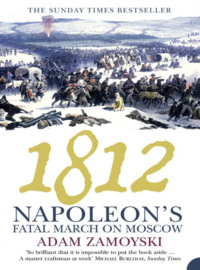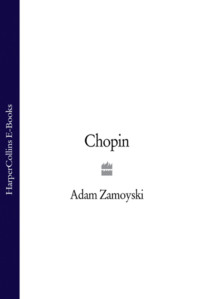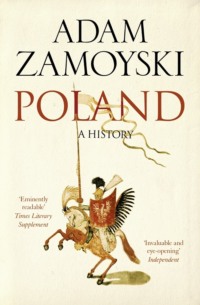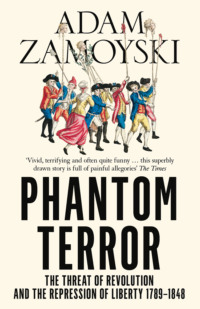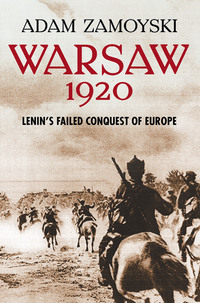
Полная версия
Rites of Peace: The Fall of Napoleon and the Congress of Vienna
Germany had been more profoundly affected than any other part of Europe by the French Revolution and subsequent interference by Napoleon. In 1789 the German lands had belonged to the Holy Roman Empire, a bewildering patchwork of some three hundred independent sovereignties and thousands of lordships, abbeys and orders, whose forms of government ranged from absolutist monarchy, through ecclesiastical authority, to republican cities. The army of the empire was made up not only of regiments, but companies and even platoons composed of soldiers supplied by different states. The captain of a company might be commissioned by a sovereign count, the lieutenant by a free city and the second lieutenant by an abbess.
All this had been gradually swept away following French incursions into the Rhineland in 1792, and between 1801 and 1809 Napoleon thoroughly rearranged the area. His intention was to reduce and isolate Austria, to enlarge Prussia, which he hoped to keep in the French camp, and to create a number of secondary states such as Bavaria, Baden and Württemberg, whose gratified rulers would be devoted allies. By the Act of Mediatisation in 1803 he suppressed most of the sovereignties, and in 1806 he bound the remainder into the Confederation of the Rhine, the Rheinbund, of which he made himself protector. While he grouped them together in this way, his hold was based on playing them off against each other and keeping them in a state of dependence. And none of them was entirely master in his own house, as Napoleon had left a number of ‘mediatised’ counts and knights (Standesherren) within their realms who were subject not to them but to him.
The winners were not only the Electors of Bavaria, Württemberg and Saxony, who became Kings, or the other rulers who had seen their status raised, but also all those such as merchants liberated from archaic restrictive regulations, artisans who could throw off the shackles of the guilds, the Jews who were able to leave their ghettos, and countless others. The losers were the hundreds of dukes, princes, counts palatine, bishops, margraves, burgraves, landgraves, abbots, abbesses, grand masters and imperial knights who lost lands and prerogatives, as well as the free cities, which saw their independence abolished in the process.
The German state that had gained most was Prussia. By making common cause with France against the other German states in 1795, she had acquired valuable territories in the Rhineland, which she later exchanged for more extensive ones in central Germany. She took Hanover as the prize for supporting Napoleon against Austria in 1805. But in the following year Prussia had changed sides, and following his crushing victories over her at Jena and Auerstadt in 1806, Napoleon had considered abolishing the Prussian state altogether.

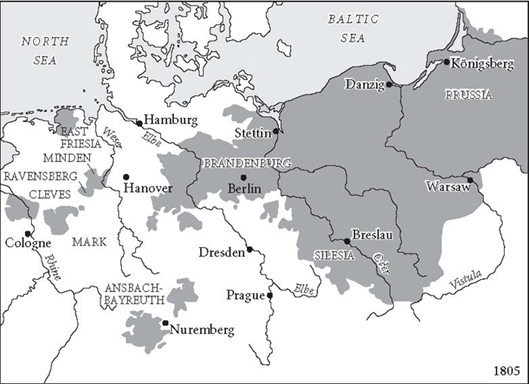
The rise and fall of Prussia, 1700–1807
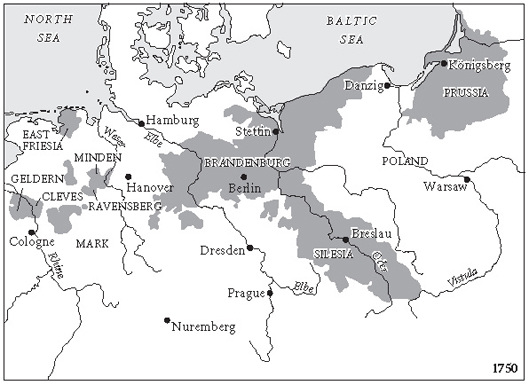
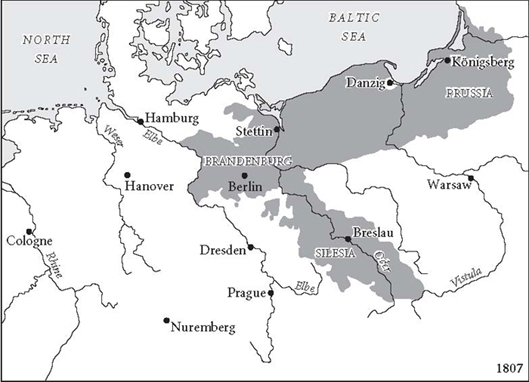
The kingdom of Prussia had only come into existence in 1701, when the Elector of Brandenburg unilaterally assumed the royal title. By 1750 it had grown territorially by over 50 per cent through the conquest of Silesia. It more than doubled in size between then and 1805, becoming a power of the first rank. But it was a curiously fragile one. Its greatest ruler, Frederick II, used to say that its arms should feature not the black eagle but rather a monkey, as all Prussia was good at was aping the great powers. It fielded six times as many soldiers relative to its population as Austria, and most of its resources were dedicated to supporting this vast army, the sole basis of its power.7
In the event, Napoleon did not abolish Prussia; he merely stripped her of most of the Polish provinces acquired over the past decades, which he turned into a French satellite under the name of the grand duchy of Warsaw. He thereby reduced Prussia’s population from almost nine to less than five million. What remained of Prussia had to accommodate French troops, who extorted money and fodder through officials who took every opportunity to humiliate the Prussians as they spoliated their country. Given the French Emperor’s well-known contempt for the Prussians, the existence of the state remained in question. The Prussian army had been reduced to a paltry 42,000, nearly 30,000 of whom would be obliged to take part in Napoleon’s Russian campaign in 1812.
Reaction had set in as soon as the shock of the 1806 defeat had worn off. The large numbers of cashiered Prussian officers joined patriotic intellectuals to wallow in sullen resentment of all things French. Many of the officers took service in the armies of Austria or Russia, while the patriots dreamed of a national resurgence and of revenge, and took heart from the example set by the guerrilleros of Spain.
Poets such as Ernst Moritz Arndt, Heinrich von Kleist and Theodor Körner encouraged these feelings with patriotic verse and nationalist catechisms; philosophers and publicists argued about what form Germany should take in an ideal world. Young men came together in the Tugendbund, the League of Virtue, to discuss and prepare; others followed Friedrich Jahn in physical preparation for the forthcoming war through athletic exercise.
A number of senior officers devoted themselves to the cause in more practical ways. Gerhard Johann Scharnhorst, Gebhard Blücher, Leopold von Boyen and August Gneisenau worked at restructuring the army and instilling military virtues into the population as a whole. Others, such as Wilhelm von Humboldt, took a hand to the educational system, or sought to reform the state itself. Foremost among these was a civil servant by the name of Karl Heinrich vom Stein, who was, like many of the other reformers, not actually a Prussian.
Stein had been born in Nassau, a Freiherr or imperial knight of the Holy Roman Empire. There was nothing in his origins or station that destined him to become a German patriot – indeed his younger brother Ludwig became an officer in the French army. After law studies at the university of Göttingen, he took service in Prussia, originally in the Directorate of Mines, where he made a name for himself as an energetic administrator, builder of roads and digger of canals.
Stein was a man of austere morals and strict principles who disapproved of all excesses, either political as in the case of the French Revolution or moral as in the case of the sexual licence he deplored in others. But he was more elastic when it came to politics.
Though deeply shocked by the treacherous manner in which, by the Treaty of Bâle (Basel) in 1795, Prussia acquired new lands along the Rhine, he nevertheless applied himself to their incorporation into the Prussian state. Any moral qualms he might have had gave way before his overriding instinct to tidy up the messy medieval legacy and rationalise the whole of Germany into one efficient state. In common with many patriots all over Germany, he had come to the conclusion that the only way to place their country and its culture beyond the reach of interference from France or any other power was to create a unified German state strong enough to exclude outside influence and resist military aggression.
The philosopher Johann Gottlieb Fichte was preaching that the nation was a spiritual as well as a physical entity, which embodied something of a higher order than any attachment to a state or a King, and there were many, particularly in the universities, who longed to see a German republic. However much they might have empathised with such views, to patriots such as Stein, Gneisenau and Humboldt it was evident that a united Germany could not be built out of nothing. They therefore served the one German state that appeared to be in a position to gradually engulf the others and bring about the same end – Prussia.
In 1804 Stein was called to a senior post in Berlin. He was horrified at the corruption and inefficiency he encountered there, and dismayed at the mediocrity of the monarch he was serving. He strongly disapproved of Frederick William’s alignment with France in 1805 and his consequent seizure of Hanover. Along with others, he persuaded the reluctant Frederick William to switch to the side of the coalition against Napoleon, and when this led to the disasters of Jena and Auerstadt he was dismissed in January 1807, with a string of imprecations from the King.
It was all the more galling for the unfortunate King that a few months later Napoleon, who had reduced Prussia to an entirely subservient condition, having heard that Stein was a good administrator but not that he was a German patriot, instructed Frederick William to nominate him as his principal minister. Stein took the opportunity provided by his new position to introduce an edict of emancipation which transformed Prussia from a feudal monarchy into a modern state, and followed this up with administrative, municipal and military reforms. Barely more than a year later an intercepted letter revealed to the French police the extent of Stein’s hatred of the French, and in consequence Napoleon had him dismissed and declared an outlaw. Rendered penniless at a stroke, Stein took refuge in Austrianruled Prague.
In 1812 Stein was summoned to Russia by Tsar Alexander. The two had met in Berlin in 1805 and been drawn to each other by the high-minded ideals – and, no doubt, by the priggishness – they shared. As the Grande Armée advanced into Russia, raising doubts as to the competence of Alexander and his generals, the Tsar suffered moments of self-doubt and emotional stress. In these circumstances Stein’s unshakeable belief in him as the champion of the universal anti-French cause proved invaluable as both solace and support. His influence over the Tsar grew in proportion.
He took over the direction of a German Committee set up by Alexander to coordinate pro-Russian sentiment throughout German lands, and turned it into an instrument for his own ends. On 18 September 1812, a couple of days after Napoleon had crushed the Russians’ last stand at Borodino outside Moscow, Stein produced a memorandum which sketched out his plan to create a unified German state. He was convinced that Russia would prevail in the end, and argued that having defeated the French she must carry the war into Germany and liberate Europe from their yoke.
When, three months later, the remnants of the Grande Armée straggled back across the frontier, the Russian commander Field Marshal Kutuzov and most of his senior officers argued against pursuing them further. Kutuzov would continue to beg Alexander to make peace and go home, and to advise against crossing the Elbe, until his very death, on 28 April 1813 at Bünzlau (Bolesławiec). Even the most ardent Russian patriots, such as his Minister of the Interior Admiral Shishkov and the Archimandrite Filaret, were against Alexander’s proposed liberation of Europe. The consensus was that Russia should help herself to East Prussia and much of Poland, providing herself with some territorial gain and a defensible western border, and leave it at that. But Alexander ignored them.8
When the Russian armies did advance, Alexander put Stein in charge of administering German territory in their rear, and he went to work setting up not only organs of local administration, but representative bodies as well. He recruited volunteers, called up reservists, formed a new militia, the Landwehr, to be supported by a home defence force, the Landsturm, all in the name of the King of Prussia but without his knowledge, let alone his authority.
Although Alexander’s behaviour encouraged Stein in the belief that he was going to be able to put into effect his dream of a united Germany, the Tsar stopped short of endorsing it. He wished to be the healer of past ills and the bringer of happiness to the Germans as well as the Poles, and indeed to all the inhabitants of the Continent. But while he enjoyed being the anticipated saviour, he had no fixed programme. He also needed to keep his options open. Nevertheless, the expectations he aroused introduced unaccountable new elements into what was already a volatile situation.
The first obliged to confront these was King Frederick William of Prussia, and he was a worried man in those early months of 1813. ‘Make use of the authority granted you by God to break the chains of your people!’ Stein exhorted him from St Petersburg at the end of December 1812. ‘May its blood no longer be spilt on behalf of the enemy of humanity.’ But the Prussian King was not a born hero.9
His innate weakness undermined the advantages of a kindly and God-fearing nature, and made him suspicious as he clung to power, while his sense of failure nourished a false pride and a mean streak. He had been forced to give up half of his kingdom only ten years after acceding to it, and had been gratuitously humiliated by Napoleon. The knowledge that everyone compared him with his famous predecessor and great-uncle Frederick the Great only compounded this sense of failure. The one light in his life had been his Queen, the beautiful and universally admired Louise, to whom he had been attached by a true and mutual love. But she had died in 1810. He hung on to the remains of his realm, seeing in a close association with Napoleon the only means of survival.
General Yorck’s defection from the French ranks raised the terrifying possibility of French retaliation. Frederick William therefore loudly denounced it as an act of mutiny and made great show of standing by his alliance with Napoleon. But his ally was far away in Paris mustering a new army, the Russians were flooding into his kingdom from the east, and public opinion was against him.
Frederick William should have had every reason to welcome the approach of the Russians. Back in 1805 when they had met for the first time in Berlin, he and Alexander had sworn eternal friendship at midnight over the tomb of Frederick the Great. That friendship had been only slightly marred by Frederick William’s forced contribution of troops to Napoleon’s invasion of Russia, and the Prussian King knew that he had the sympathy of Alexander. Yet he viewed the approach of the Russian armies with misgivings and even fear.
Alexander’s appointment of Stein was, considering their past relationship, almost an insult. Stein’s disregard for Frederick William’s authority as he set about administering East Prussia was an open affront. It might signify that Alexander was preparing to detach that province from the Prussian kingdom. Stein’s calls for a pan-German war of national liberation were even more alarming. He made no secret of his views that all German rulers who had allied with Napoleon were ‘cowards who sold the blood of their people in order to prolong their miserable existence’. The prospect of his being let loose on Germany aroused legitimate fears of social upheaval and even revolution, which Frederick William would be in no position to oppose.10
He was in an unenviable position. The strong French garrison ensconced in the fortress of Spandau paraded through Berlin daily, reminding him that there were more French than Prussian troops in the country. The probability was that Napoleon would be back in the spring with a fresh army, with which he would crush the Russians. Even if he did not hope for a Russian defeat, Frederick William ardently desired the stability which only such a return could guarantee. What he dreaded above all was the possibility that Alexander and Napoleon might yet reach an accommodation, the principal victim of which would almost certainly be Prussia: an obvious solution would have been for Russia to take East Prussia and all Polish lands up to the Vistula as the price for continued French control of Germany.
Frederick William calculated that if he could negotiate better terms with Napoleon, he would be in a position to reassert his authority, control the hotheads in his dominions and face Russia on more level terms. It was, of necessity, the lesser of two evils. ‘By allying with France, the least that could be expected was a further degree of ruin for the kingdom, which would inevitably become the theatre of the war,’ wrote the Prussian chancellor, Baron August von Hardenberg, ‘but if one were to enter into alliance with Russia, how could one dare to confront once again the implacable vengeance of Napoleon?’11
Frederick William therefore sent Prince Hatzfeldt to Paris with the proposal of an active alliance against Russia, on condition that France paid the ninety million francs she owed Prussia and agreed to the restitution of some of her former territory in Poland. The alliance was to be sealed by the marriage of the Prussian Crown Prince to a princess of the house of Bonaparte. Failing to get a response, in February 1813 he made two further such proposals to Napoleon.12
But Frederick William could not procrastinate much longer. In the absence of any encouraging signal from Napoleon, and in view of the fact that over two-thirds of his army was by then operating in defiance of him, he made a move. On 22 January 1813 he left Berlin, with its French garrison and swarms of French officials, for Breslau (Wrocław), the capital of his province of Silesia. Although the French ambassador Saint-Marsan accompanied him, the King felt less under surveillance there. While making repeated professions of loyalty to Napoleon, he sanctioned the formation of a volunteer corps of Jägers and the call-up of all men aged between twenty and thirty-four, ostensibly in order to be in a position to offer his ally Napoleon fresh troops in the spring.
On 9 February he sent Colonel Knesebeck to Alexander’s headquarters at Kalisch (Kalisz) to seek assurances that, provided he did not take Napoleon’s side in the forthcoming conflict, Prussia was not going to be pushed westwards and turned into some kind of buffer state. Alexander was not best pleased by Frederick William’s envoy. Knesebeck asked the Tsar to dismiss Stein and to promise that he would hand over Prussia’s old Polish provinces, incorporated into the grand duchy of Warsaw in 1807, which were now under Russian occupation. Alexander took this approach as an expression of a lack of faith in his magnanimity. Ignoring Knesebeck, he despatched Stein to Breslau with a letter to Frederick William and the draft of a treaty of alliance between them. Stein’s arrival on 25 February was most unwelcome to the King.
Time was running out, as the Russian armies covered ever greater areas of his kingdom, and the German patriots who marched with them incited his subjects to rise and fight regardless of their King. On 19 February Fichte had ended a lecture he was giving at the university in Berlin with the words: ‘This course will be suspended until the close of the campaign, when we will resume it in a free fatherland or reconquer our liberty by death.’ Young men from all over Germany flocked to join a Freikorps under Adolf von Lützow, dedicated to the liberation of Germany. A wave of excitement rippled across the country. ‘German spirit, German courage raised hopes of better days,’ wrote the patriotic salonière Caroline Pichler, noting that the voices of young men had a fresh, warlike ring.13
Frederick William was cornered, and on 27 February he signed the treaty brought by Stein. It was ratified and dated at Kalisch on 1 March. Frederick William set to work raising troops and, as a token of reconciliation with his wayward army, founded the Order of the Iron Cross. Two weeks later Alexander joined Frederick William at Breslau, and on 16 March Prussia declared war on France. Alexander and Frederick William were, for better or worse, allies.
The alliance placed Frederick William in a subservient position. The one promise that he had extracted from Alexander was that in a secret article of the treaty he solemnly undertook ‘not to lay down arms as long as Prussia will not be reconstituted in statistical, geographical and financial proportions equal to those she had before’ 1806. Since Alexander was already in possession of all the territory Prussia had lost then, Prussia could only wait for him to either give it back, which seemed unlikely, or to use his power to obtain a comparable tranche of land for her from future conquests elsewhere in Germany. The word used, ‘equivalents’, was harmless enough, but it left unanswered the question of where they were to be found, and who was to be dispossessed in order to provide them – every piece of land belonged to somebody.14
While people all over Europe who had grown tired of Napoleonic dominance saw Alexander as a liberator, few appreciated that he had assumed a right to play the decisive role in the future arrangement of Europe. It was not merely a question of his having triumphed over Napoleon. Over the past few years he had come to view his struggle with the French Emperor not only as a personal contest, or as a clash between two empires, but as a veritable Armageddon between good and evil.
The Tsar’s idealism coupled with his political disappointments and humiliations on the battlefield had led him towards mysticism. His close friends included followers of Saint-Martin, Swedenborg and Lavater, and he was conversant with the literature of mysticism and with German pietism. As he watched his country being invaded and ravaged in 1812, he had sought solace in resignation to the will of God, and when the fortunes of war swung back in his favour he saw it as a manifestation of that will. From there it was but a short step to seeing himself as its instrument. He interpreted the suffering his country and its people had endured over the previous year as a purifying preparatory ordeal, and saw in it a kind of moral capital that gave him an authority superior to that of any of the other monarchs of Europe.
Like Stein and many German patriots, he had come to see the war as a crusade, not so much against France as against what France stood for – revolution, moral depravity and the usurpation of power. It was this last, Napoleon’s almost careless trampling of the ancient rights of other monarchs and his brazen use of force to install and dismiss sovereigns, that offended most. As he prepared to embark on the next stage of his crusade, the liberation of Germany from the usurper, Alexander called on her legitimate princes to join it.
A proclamation issued on his behalf by Field Marshal Kutuzov stressed that the armies of the Emperor of Russia and the King of Prussia were entering Germany with the sole aim of liberating her people and their princes and restoring to them their ‘imprescriptible rights’. ‘May every German worthy of the name join us with vigour and promptitude,’ it continued. ‘Let everyone, whether Prince or noble or from the ranks of the people, support with their wealth and their blood, with their body and their life, the liberating intentions of Russia and Prussia.’
The proclamation announced that the two monarchs had decreed the dissolution of the Rheinbund and intended to replace it with something modelled on ‘the ancient spirit of the German People’. And it contained a barely veiled threat to any who would not join them. ‘Their Majesties therefore demand a faithful and complete cooperation, particularly from each German Prince, and are pleased to hope in advance that there will not be found one among them who, wishing to betray the cause of Germany, will thereby deserve to be destroyed by the force of public opinion and by the power of the arms taken up so justly by them.’15
The convention signed by Russia and Prussia at Breslau on 19 March 1813 was more businesslike and precise. It stipulated that all ‘liberated’ territory would be divided into five districts and placed in the hands of a Central Administrative Council directed by Stein, which would take over the business of collecting taxes, marshalling resources and raising troops. It also restated that all the German rulers would be invited to join the cause, and made it clear that ‘any Prince who does not answer this call within a specified period will be threatened with the loss of his state’.16


